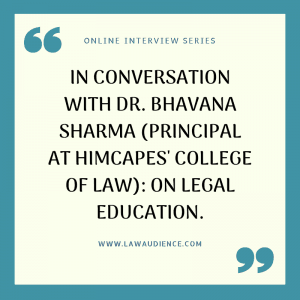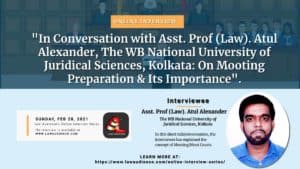Dr. Dakshita Sangwan is currently working as Assistant Professor at G.D. Goenka University. In this Interview she is sharing her views on Legal Research Writing and Plagiarism. It was a pleasure interviewing Dr. Dakshita Sangwan. Here’s the conversation with her:
Question No. 1: Varun Kumar, from Law Audience: Before starting this interview, how you would like to introduce yourself to our readers?
Answer: Thank you Varun and Law Audience for inviting me to this conversation. I am Dr. Dakshita Sangwan working towards legal fraternity since 2008. I am the first generation lawyer in my family and with their support and blessings, I tried working in each and every field like litigation at all three levels (District Court, High Court, & Supreme Court), NHRC, NGOs, Corporate Office and Academia. I am always keen to work towards my area of interest in the ocean of the legal field. This blended experience has helped me achieving the point of more and more self-clarity as my journey has progressed, wherein, I am uncovering most of the attributes of my personality continuously, however, life is an ongoing learning process and each day something is evolved within you. More you learn, more you teach, that makes you more competent.
So, it’s a journey with milestones as the day progresses. Moreover, I have achieved what I wanted being a strategic person with loads of patience, without any regrets.
Question No. 2: Varun Kumar, from Law Audience: Please tell our audience that what constitutes Plagiarism and what is Legal Research Writing?
Answer: In academia, ‘Plagiarism’ is a known omission to give credit to the genuine author or an unknown act of snipping the ideas or style of other person’s literary work. In the existing scenario of technological advancement, it is quite challenging to write anything without comprehensive research. In fact, it is a rule of law that ignorance of the law is no excuse.
When we are talking about legal research writing, it is quite apparent that one should be aware of all available sources way before the ideas of writing. Legal Research Writing is basically a skill attained during law schools’ days that has a quite wider connotation. One thing should be clear in the mind of legal research writers that they have to produce evidence for each word produced under their name. If an evidence is found against you and that particular item is someone else’s work, then you will be accused of either plagiarism or copyright infringement.
Question No. 3: Varun Kumar, from Law Audience: Please tell our readers in detail that, what points one should keep in mind before writing a good research paper?
a) Answer: Explore, Explore, Explore! This is the only key to know that what has been done, existing work, and future suggestions in the area of your research interest. Identify the existence of your ideas and jot it down in bullet points.
b) Make a Road – Map – Generally, people start with writing without knowing how and what to write. It is advised that first decide a tentative index out of your ideas and review it with a multi-dimensional view to get a concrete idea.
c) Stages – Writing a good research paper requires stages. Take baby steps and try to cross stages with the 1-2-3 Rule. Just like a human body, start with the skeleton and cover it up with muscles, veins, layers of tissues, and outer look. While doing so, imagine inside out and vice versa look of your paper.
d) Crisp and Crystal clear – Keep a track of the theme of your paper and find answers to what, when, why and how. Don’t give vague ideas and incomplete information. Substantiate it with statistics and authorities in the paper.
e) Simple Language – Keep your language simple, so that a layman is benefitted from your ideas and information.
f) Style – Explore your favourite style of writing to lay down the ideas. Take either ascending or descending sequential order of incidence while writing. Don’t mix it up.
Question No. 4: Varun Kumar, from Law Audience: Many people copy & paste the Case Laws and Bare Provision as it is. Do you think that this practice is good?
Answer: Quoting case laws and bare provisions for substantiating interpretation of the subject in your paper is not considered as a plagiarized work. However, content should be written within inverted commas with indent and proper attribution should be given to the source. Further, for a good piece of a research paper, one should assume that readers are well aware of the provisions, otherwise, it may be quoted properly as referred in citation style.
Question No. 5: Varun Kumar, from Law Audience: According to you, what points one should keep in mind while submitting a paper for publication in a Journal?
Answer: There are numerous points to keep in mind before publication. Few of them are –
a) Targeted Audience – One should keep ‘targeted audience among readers ‘ in mind while using terminologies and vocabulary before submitting a paper.
b) The coherence of Ideas should be weaved properly.
c) Grammar – Paper should be free from all spelling and punctuation mistakes. One must recheck the usage of correct terminologies before the submission.
d) 1-2-3 Rule – The only way to get the flawless paper is to read it with the 1-2-3 Rule. The ‘1-2-3 Rule’ means giving gaps for an hour, two and three after each reading while vetting and drafting the paper. After each gap, do some other activity, it helps your cognitive brain to work efficiently, and you start noticing each mistake in your paper either relating to format, language, ideas, or articulation of paper.
Question No. 6: Varun Kumar, from Law Audience: Do you think that mere citing the source is sufficient to avoid the issue of Plagiarism?
Answer: Mere citing is not going to avoid the issue of plagiarism. There can be a plagiarism of ideas, style, intent, content, para-phrasing, source, and suggestions. One has to be cautious before sending the manuscript to the publisher to explore whether the similar or duplicate paper had not been published in the same duration. The reasons should be recorded if any similar work is found with your intent and timeline. I have seen many cases, wherein, the author takes more than expected time to publish his work and meanwhile, there is another similar published work (maybe started lately) that floats in the market.
Question No. 7: Varun Kumar, from Law Audience: Many students Paraphrase their articles and think that this does not amount to Plagiarism. What’s your point of view on that?
Answer: That’s another form of ghostwriting and I call it as a potluck paper. One should be careful and try writing their own ideas with proof and theories involved without thinking about the world.
Question No. 8: Varun Kumar, from Law Audience: According to you, what is the role of colleges & universities regarding the same?
Answer: I believe that every College and University should mandatorily follow research guidelines of affiliating institutions. Also, a fixed ‘Code of Research Ethics’ must be followed in every educational institution. The effective implementation of the ‘Code of Research Ethics’ will surely lead to quality research by the persons concerned.
Question No. 9: Varun Kumar, from Law Audience: Please give a few tips to avoid the issue of Plagiarism.
Answer: Well, it is quite difficult to summarize the acts of Plagiarism but few suggestions may help the young generation for writing a good piece of research work:
a) Read the final manuscript with 1-2-3 Rule.
b) Pick a few keywords /sentences from your article and try finding similar content on the internet. The reading and skimming of those resources will give you a fair idea about your paper.
c) If yours inner writer feels to redraft and redo, then do it. Don’t immerse in the pressure of deadlines, number of publications or academics. Make ‘quality work’ your habit. You will improve your writing and analytical skillset with each published paper.
d) Get your paper reviewed from a trusted mentor or acquaintance for peer review before its submission.
e) Work conscientiously on the suggestions and comments of the peer–review committee.
One should keep it in mind, that yours published non-plagiarized research article is going to motivate a thousand brains in writing good research papers. This is how we may make a better society and refine knowledge may be transferred to future generations.
Question No. 10: Varun Kumar, from Law Audience: Many students copy the content from various articles of various authors and claim that the fair use is allowed under the Copyright Law for education & research also. What’s your take on that?
Answer: Plagiarism is a process of using someone’s ideas or style without giving credit, whereas, copyright infringement indicates the usage of work of someone without permission. One should be careful while citing any resource, check disclaimers, and act wisely.



